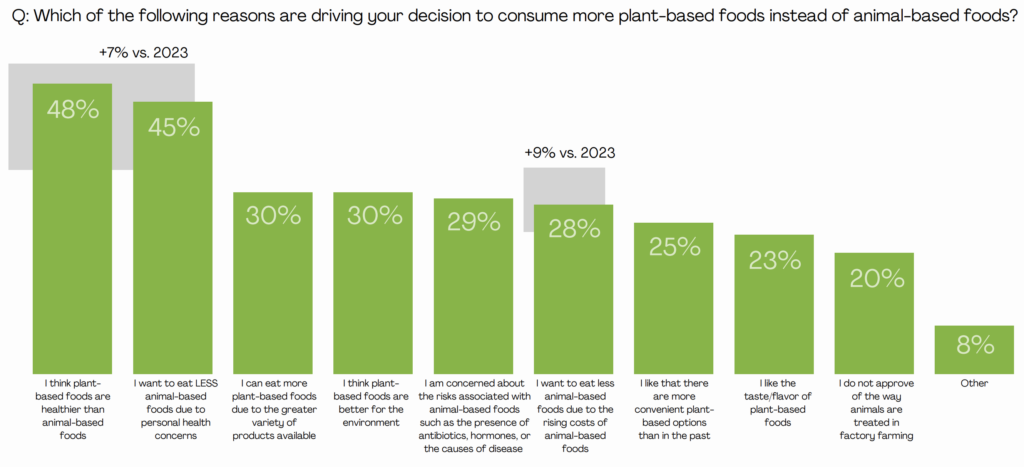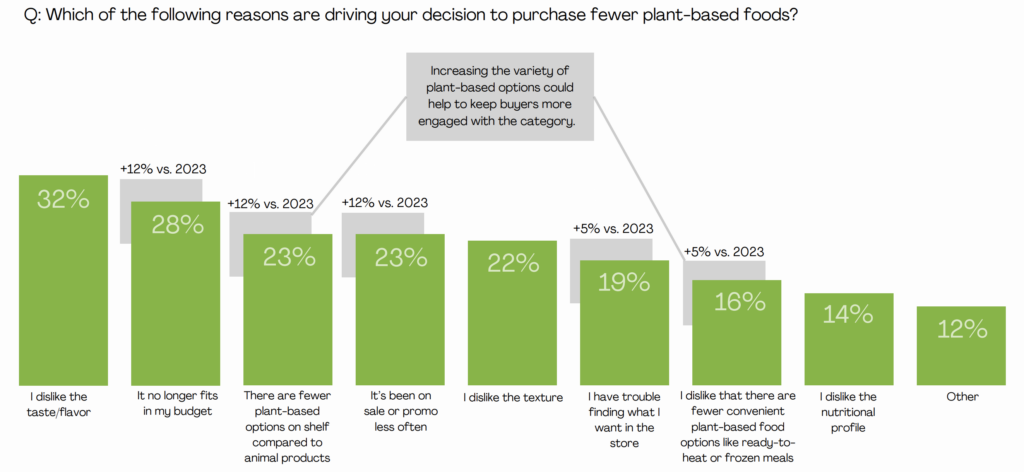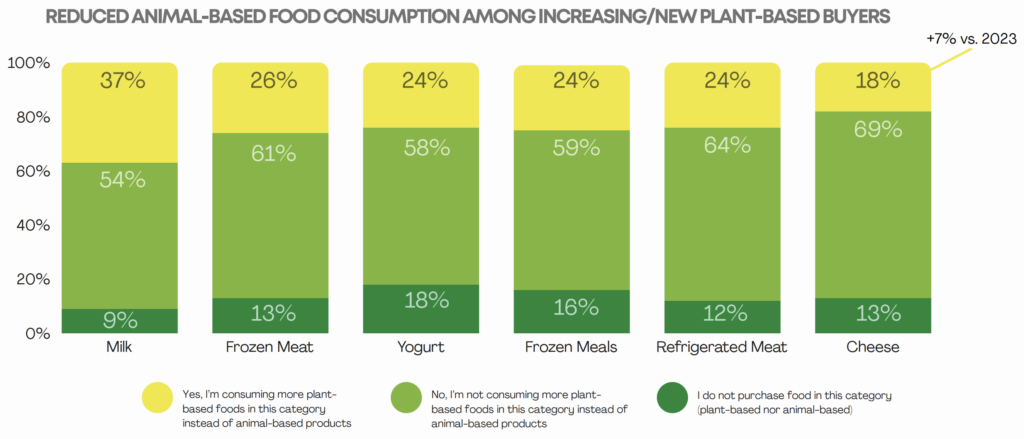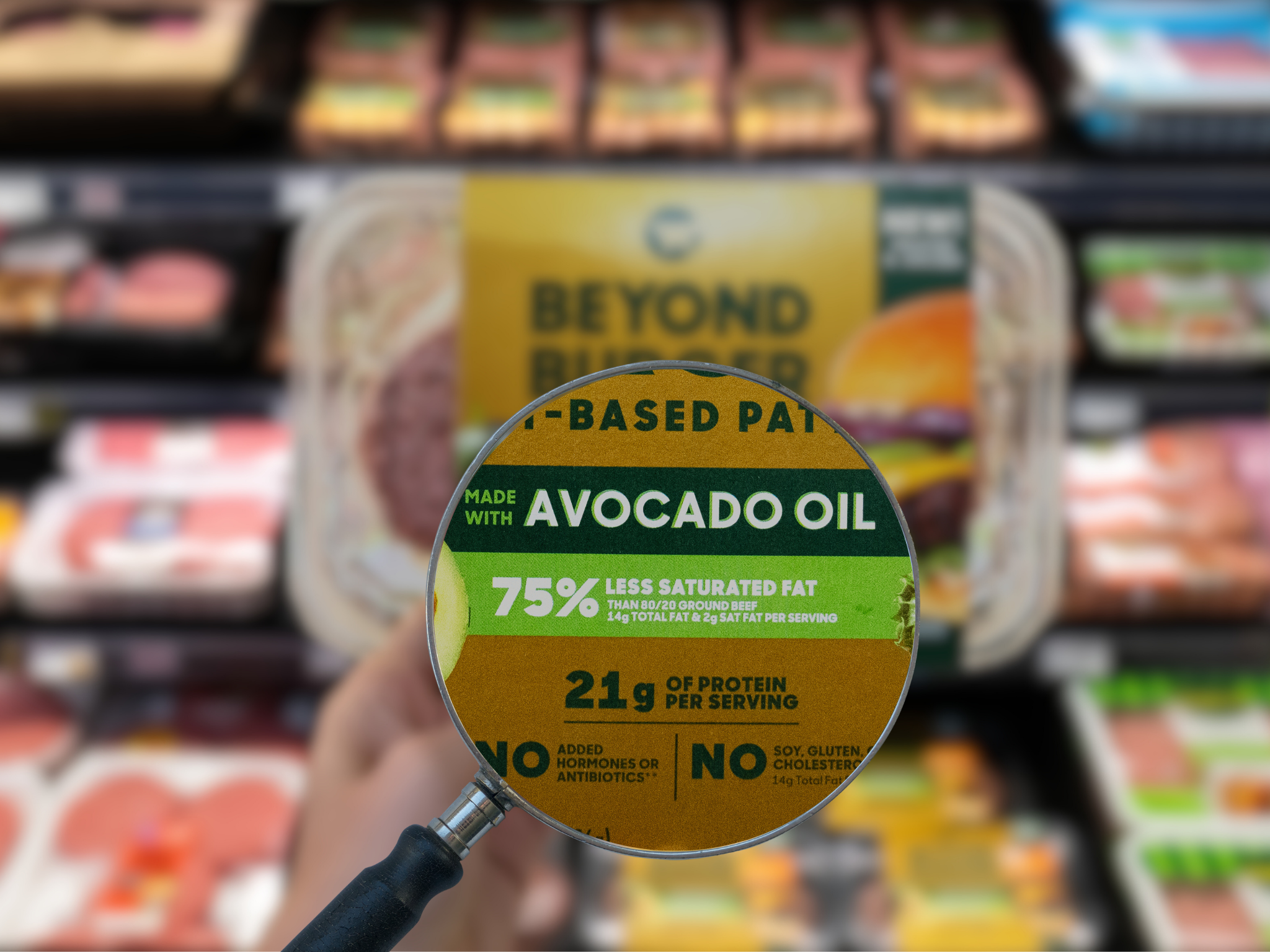Health is ‘Main Reason’ Americans Eat Plant-Based Meat Now – Cheaper, Tastier Products Are Key for Growth
6 Mins Read
Americans are attracted to meat analogues mainly for their health benefits, but to overcome the sales slump, plant-based companies must offer better-tasting and cheaper products.
The health halo created by meat producers is fluttering. People are now actively moving away from animal proteins as they realise the burdens they put on the human body – after all, red and processed meat have been labelled carcinogens by the WHO, adding to their contribution to heart disease, diabetes and obesity risks.
Plant-based meat, of course, provides a viable alternative. And in the last year, there has been a notable shift in this industry’s marketing playbook. Climate change, the reason why most companies say they exist, is no longer the top message anymore. Now, it’s health first.
And this is an intentional effort. For Americans, health is now the top reason to shift from animal proteins to plant-based analogues. Despite their sales dwindling over the last couple of years, consumers remain interested in vegan meat products because they believe they are better for their personal health and don’t pose disease risks.
That said, there remains a large gap in purchase drivers and barriers – some households have decreased their consumption of plant-based meat due to their taste or texture and higher prices.
This is according to a new study by Kroger, the Plant Based Foods Institute (PBFI), and 84.51°, which revealed that flexitarians are gradually reducing their spending on animal proteins for the fourth year in a row. The Plant-Based Migration Analysis analysed the behaviour of over seven million US households in 2022-23 and carried out a survey this year to provide a blueprint for retailers to expand their vegan offering and drive the category’s growth.
“Despite economic challenges in the past few years, we continue to see that shoppers have remained engaged and interested in plant-based foods,” said Linette Kwon, data and consumer insights analyst at the Plant Based Foods Association, the site organisation of PBFI.
Health attitudes mirror plant-based brand messaging

The research revealed that 48% of US shoppers think plant-based foods are healthier than animal proteins and 45% want to eat less meat and dairy due to personal health concerns, the latter sentiment representing a 7% rise since 2023. Meanwhile, 29% of Americans are also concerned about the presence of antibiotics and hormones in conventional meat.
Three in 10 respondents say they’re enthused by the greater availability of plant-based products, and their climate credentials. And 28% want to eat fewer animal proteins because of their rising costs – beef prices reached record highs last month. In fact, the number of consumers concerned about the price of meat has grown by 9% since last year.
On the other hand, a third of Americans (32%) have been buying fewer plant-based products because they don’t like how they taste, highlighting a key hurdle for manufacturers in the space. The same percentage of people moving away from animal proteins due to high costs are deterred from plant-based options for budgetary reasons (28%), a 12% rise from 2023.

While only 14% dislike the nutritional profile, 23% feel there are fewer vegan products in-store, and 16% were dismayed by the decreased amount of convenience options like ready meals. Meanwhile, 19% have trouble finding them in the store.
“Making plant-based foods more affordable, improving the taste/texture, offering greater variety and providing more nutritional benefits would make them more likely to purchase plant-based foods,” the report says.
Industry giants like Beyond Meat and Impossible Foods have been doubling down on their products’ health benefits, with revamped recipes and packaging, new health-forward products, certifications from health organisations, targeted marketing campaigns, and even online resources dedicated to fighting misinformation.
“It’s not necessarily that sustainability has become less important, but we have to meet our consumers where they are. Health is a major driver when it comes to purchasing plant-based food,” Sherene Jagla, chief demand officer at Impossible Foods, told Green Queen this week. “It’s important that we’re educating consumers about the nutritional value of our products so they can understand how it might fit into their lifestyles.”
Sales are still down, and improvements are crucial

In line with sales data, milk alternatives seem to be the most popular plant-based product. More than a third (37%) of Americans are drinking more alt-milk now, and in place of dairy. Around a quarter are doing the same with frozen meat analogues (26%), refrigerated vegan meat, yoghurt, and frozen meals (24% each).
The share is slightly lower for vegan cheese (18%)- it has jumped by 7% from last year. “Shoppers who are increasing their spend on plant-based milk, cheese, and fresh meat are actively decreasing their spend in corresponding animal-based categories,” the report states. “This indicates their dedication to making a switch to more plant-based foods.”
Julie Emmett, VP of marketplace development at PBFA, said the research showcases evidence of a protein transition for a variety of reasons: “Retailers can use this extensive research to develop merchandising and marketing strategies for long-term growth.”
In Europe, this shift is already in motion. Lidl and Ahold Delhaize are aiming to become the first supermarket groups to set sales goals in line with their climate ambitions by setting ‘protein split’ targets, which involve increasing the share of plant-based food sales while decreasing animal protein sales. The WWF last week published a methodology for retailers to measure protein sales, urging them to make 74% of all food sold plant-based.
The PBFI report recommends manufacturers and retailers optimise pricing and promotion strategies to make plant-based foods more affordable to a wider group of consumers and improve the taste and texture of products while offering unique items and cleaner labels.
They also write that making vegan food easy to find in-store and online is critical, and can be helped by digital and in-store signage. In addition, the report says companies should provide recipe inspiration and education about the health benefits of these products to pique consumer interest.
These measures are important when you consider the continued struggles of plant-based meat, whose sales fell by 12% in 2023, according to SPINS data crunched by the Good Food Institute. This decline has not been stemmed, with meat alternatives down by 9% in the year ending July, per Circana. And since 2020, the number of alt-meat brands has shrunk by 28%, from 116 to 83.
Prices of vegan meat and seafood also swelled by 9% in 2023, compared to 3% for their conventional counterparts – this meant there was a 77% price premium on the former. But consumers haven’t permanently turned away from these products. Cutting prices will attract more of them back, as was evidenced by Lidl’s trial in the Netherlands.
“As the challenges of price and findability improve, we believe different plant-based categories will have many more opportunities to better reach shoppers,” said Kwon.



